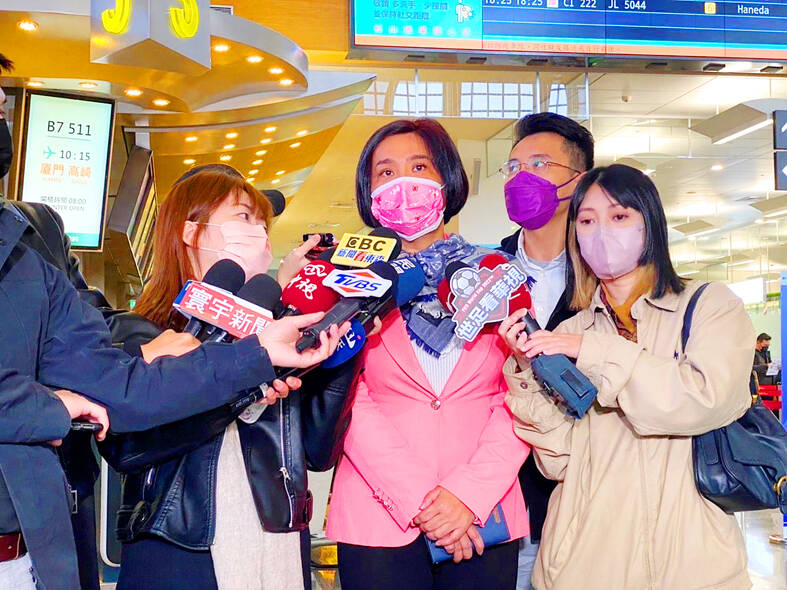A group of Chinese Nationalist Party (KMT) lawmakers and newly elected county commissioners yesterday arrived in Xiamen to meet with Chinese officials, days after Beijing extended effective bans on Taiwanese exports to include liquor and more types of seafood.
Chen Fu-hai (陳福海) and Wang Chung-ming (王忠銘), who are to take office as Kinmen and Lienchiang county commissioners respectively on Dec. 25, arrived in China’s Fujian Province yesterday afternoon.
They were joined by KMT legislators Jessica Chen (陳玉珍) from Kinmen and Chen Hsuen-sheng (陳雪生) from Lienchiang County, and Lienchiang County Council Speaker Chang Yuan-chiang (張永江).

Photo courtesy of Chen’s office
They were reportedly given special permission to forgo COVID-19 quarantine for their two-day trip, and are to return at 6pm today.
Jessica Chen told reporters at Kinmen Airport that the group was invited to discuss the recent suspensions of Taiwanese imports and the resumption of the “small three links” with officials responsible for Taiwan affairs.
Travel between the counties and China’s Fujian Province has been difficult since the links were suspended on Feb. 10, 2020, due to the COVID-19 pandemic.
Now that pandemic-related border restrictions have been eased for the rest of the country, county residents are calling for the restoration of the small three links, which allow for direct transportation, postal services and trade with China.
With the small three links suspended, it has been difficult to develop Kinmen’s economy, Jessica Chen said.
With exports of Kinmen Kaoliang Liquor Inc to China suspended, she said she fears another large blow to the county’s economy and tax revenue.
During their visit, she said that representatives are to discuss the reasons behind the suspensions, as well as protocols for Taiwanese traveling to China once the small three links are reinstated.
She said that in December last year, she invited Cabinet officials to the legislature to respond to concerns about the new Chinese import registration rules and the effect it might have on liquor exports.
A decision was reached at that meeting to seek an explanation from Beijing and to assist Kinmen Kaoliang with any needed documentation, but a year later, the issue remains unresolved, she said.
The delegation is traveling to China to better understand the problem to help stakeholders in Taiwan, she said.
In response to questions about the trip, Presidential Office spokesman Xavier Chang (張惇涵) yesterday reiterated a comment from President Tsai Ing-wen’s (蔡英文) Double Ten National Day speech, in which she said she “looks forward to the gradual resumption of healthy and orderly cross-strait people-to-people exchanges.”
However, any decision regarding the small three links depends on developments in the pandemic and the overall cross-strait situation, he added.
Premier Su Tseng-chang (蘇貞昌) raised concern over the rise in COVID-19 cases in China, saying that it could harm the health of Taiwanese if the nation opens its borders.
Additional reporting by Chen Yun and Hsu Tzu-ling

A Taiwanese software developer has created a generative artificial intelligence (AI) model to help people use AI without exposing sensitive data, project head Huang Chung-hsiao (黃崇校) said yesterday. Huang, a 55-year-old coder leading a US-based team, said that concerns over data privacy and security in popular generative AIs such as ChatGPT and DeepSeek motivated him to develop a personal AI assistant named “Mei.” One of the biggest security flaws with cloud-based algorithms is that users are required to hand over personal information to access the service, giving developers the opportunity to mine user data, he said. For this reason, many government agencies and

The National Fire Agency on Thursday said a series of drills simulating a magnitude 8.5 earthquake would be held in September to enhance the government’s emergency response capabilities. Since earthquakes cannot be predicted, only by continuously promoting disaster prevention measures could Taiwan enhance its resilience to earthquakes, agency Director-General Hsiao Huan-chang (蕭煥章) said in a news release. The exercises would be held to mark annual National Disaster Prevention Day on Sept. 21, the aim of which is to test Taiwan’s preparedness and improve its earthquake resilience in case of a major temblor, Hsiao said. As part of those drills, an earthquake alert would

DEFENSE: The National Security Bureau promised to expand communication and intelligence cooperation with global partners and enhance its strategic analytical skills China has not only increased military exercises and “gray zone” tactics against Taiwan this year, but also continues to recruit military personnel for espionage, the National Security Bureau (NSB) said yesterday in a report to the Legislative Yuan. The bureau submitted the report ahead of NSB Director-General Tsai Ming-yen’s (蔡明彥) appearance before the Foreign and National Defense Committee today. Last year, the Chinese People’s Liberation Army (PLA) conducted “Joint Sword-2024A and B” military exercises targeting Taiwan and carried out 40 combat readiness patrols, the bureau said. In addition, Chinese military aircraft entered Taiwan’s airspace 3,070 times last year, up about

STRICTER ENFORCEMENT: Taipei authorities warned against drunk cycling after a sharp rise in riding under the influence, urging greater public awareness of its illegality Taipei authorities have issued a public warning urging people not to ride bicycles after consuming alcohol, following a sharp rise in riding under the influence (DUI) cases involving bicycles. Five hundred and seven people were charged with DUI last year while riding YouBikes, personal bicycles, or other self-propelled two-wheelers — a fourfold increase from the previous year, data released by the Taipei Police Department’s Traffic Division showed. Of these, 33 cases were considered severe enough to be prosecuted under “offenses against public safety,” the data showed. Under the Road Traffic Management and Penalty Act (道路交通管理處罰條例), bicycles — including YouBikes and other